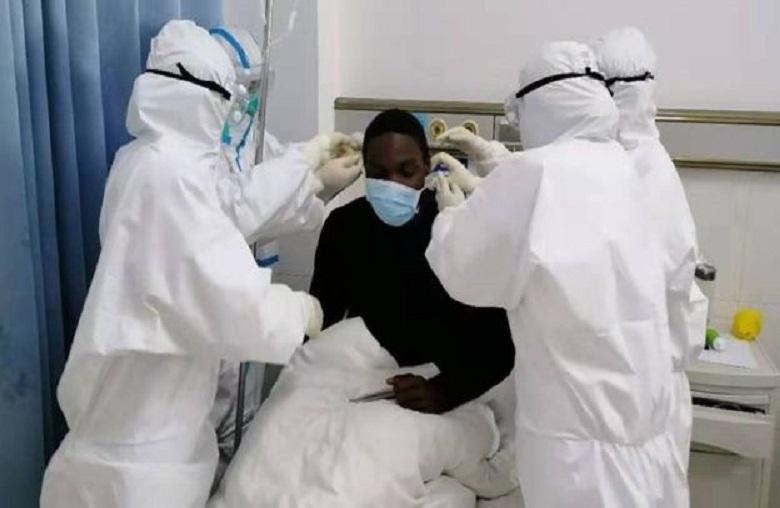Cameroonian student Kem Senoua has become the first African to have contracted the coronavirus in China. The 21-year-old Cameroonian student, who is living in the Chinese city of Jingzhou, contracted the virus but had no intention of leaving China.
According to BBC, When Kem Senou Pavel Daryl, a 21-year-old Cameroonian student living in the Chinese city of Jingzhou, contracted the coronavirus, he had no intention of leaving China, even if he could. “Whatever happens, I don’t want to bring the disease back to Africa,” he said from his university dormitory, where he is currently under quarantine for 14 days.
He suffered from fever, a dry cough, and flu-like symptoms. When he fell ill, he thought of his childhood in Cameroon, where he contracted malaria. He feared the worst. But when he went to the hospital for the first time, he was thinking about his death and how he thought it was going to happen.
For 13 days, Kem remained in solitary confinement at a local Chinese hospital. The 21-years student from Cameroon was treated with antibiotics and drugs commonly used to treat patients with HIV. After two weeks of intensive care, he began to show positive signs of recovery.
The CT scan showed no signs of the disease. Therefore, Kem Senoua became the first African in china known to be infected with the deadly coronavirus and also the first to recover. The Chinese state covered his medical care.
“I don’t want to go home until I finish my studies. I don’t think it is necessary to go home because the Chinese government has covered all the hospital costs,” said Senoua.
Leaving China
Since late January, governments around the globe, led by the United States, have started evacuating their citizens from Wuhan and neighboring cities. But thousands of students, workers, and families from Africa remain stranded in central Hubei province – the epidemic began in the provincial capital, Wuhan – and some believe their governments would have done more to help them.
“We are sons and daughters of Africa, but Africa does not want to come to our aid when we need it most,” said Tisiliyani Salima, a medical student at Tongji Medical University and president of the Wuhan Zambian Students Association. For almost a month, Ms. Salima has been living in self-quarantine.
Time has started to lose its meaning for this 24-year-old student. She spends her days sleeping and checking for updates on Chinese social media applications. It liaises between its embassy and the 186 Zambian students who live in quarantine in Wuhan. Many are concerned about food security, supply, and lack of information in a city that this week saw an average of 100 deaths a day.
She saw other international classmates evacuate the city while her compatriots were left behind. “South of the Sahara, most African countries have had a similar reaction,” said a student who agreed to speak anonymously. “African countries say China can handle the situation. But the case is not under control. When you listen to the official response, you understand that African countries do not want to offend China. We do not have the power negotiating,” said the student.
Currently, China is Africa’s largest trading partner, and the ties between the two countries have grown in recent years. China has thus become the host country for 80,000 African students, many of whom are attracted to scholarship programs. But community leaders explained that families, young and old, are stranded in Hubei province with little help or assistance from their governments.
People say, “Don’t bring us back because Nigeria can’t take care of us. But at the end of the day, I’m also human,” said Angela, a recently graduated Nigerian who only gave her first name. “I would appreciate it if they recognized that there are Nigerians here, but we don’t seem to be a priority. We have received no response from our government,” she explained.
Last week, for the first time in 22 days of confinement, the decrease in stocks forced Angela to leave her apartment to buy necessities. “The city is like a ghost town. When I left my complex, I didn’t even know if I would be allowed to go back there. People are checking the temperature outside the portal,” she said in a telephone interview with BBC, from his apartment.
On January 30, the Cameroonian community sent an open letter to President Biya, urging his government to evacuate citizens trapped in the epicenter of the epidemic. According to Dr. Pisso Scott Nseke, a community leader in Wuhan, Cameroonians are still waiting for an answer. He admits that the community is not united in the desire to be evacuated but says he is disappointed by the lack of assistance from the government.
In mid-February, Egypt, Algeria, Mauritius, Morocco, and Seychelles had removed their citizens from the province of Hubei. Other nations like Ghana and Kenya are reportedly considering evacuating.
Financial aid to their citizens
According to the head of the Ivorian student association in Wuhan, 380 dollars were given to the 77 Ivorians in the city after weeks of discussions with their government. But many of them are increasingly frustrated with the position of their government.
Ghana is also said to have sent financial assistance to its nationals. “Staying here does not guarantee our safety. We are simply in a country with better medical facilities,” said Ms. Salima.
“We feel abandoned. The Chinese were clearly irritated by the fact that the Americans had evacuated their nationals because they felt that it was causing panic,” said a student who agreed to speak anonymously. “There is a lot of distrust here towards the authorities,” he added.
It is recalled that Egypt has become the first country in Africa to confirm a case of coronavirus. Health professionals warn that nations with weaker health facilities may find it challenging to cope with a possible epidemic of the disease, which has caused more than 1,770 deaths and infected more than 72,000 people, mainly China.
